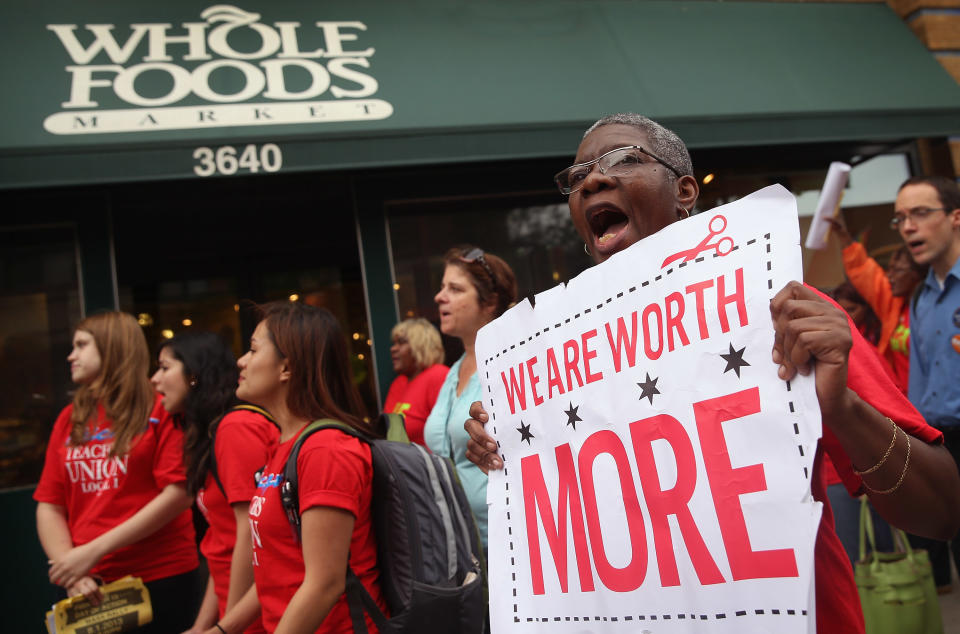Not happy with Amazon, Whole Foods workers push to unionize

Whole Foods employees are trying to unionize to fight for better benefits and improved corporate culture. The move comes one year after Amazon bought the grocery chain.
On Thursday, some current and former Whole Foods employees sent out an email to call employees nationwide to act. The initiative, named Whole Worker, states its goal as to “organize team members companywide on a global scale and collectively voice our concerns to Whole Foods Market and Amazon leadership,” according to the email Yahoo Finance reviewed. “We believe every team member deserves the opportunity to form a union of like-minded team members and push for greater compensation, benefits and profit sharing.”
Employees who received the email are invited to an anonymous chat group on Slack, where they can have “a safe and secure space to discuss our experiences working at Whole Foods”. Retail, Wholesale and Department Store Union (RWDSU) has been assisting their efforts.
Founders of Whole Worker say many of the management issues at Whole Foods date back before Amazon’s acquisition, but they have seen a further deterioration after Amazon brought its fast-moving and high-pressure style of management to the customer-centric grocer. Under Amazon, Whole Foods has been pushing centralization and taking away autonomy from regional stores.
While Amazon shares (AMZN) doubled in the past year, once soaring over $2,000 and ballooning into a $1 trillion company, some Whole Foods employees say they can’t benefit from the boom because they weren’t granted any shares. Prior to becoming a part of Amazon, Whole Foods employees with at least 6,000 actual service hours are eligible to receive stocks that could vest over the next four years, according to internal documents Yahoo Finance reviewed.
Amazon workers have been trying for years

Unions are not common among retailers nowadays, according to Peter Cappelli, a professor of management at The Wharton School. “Employers are very effective at keeping them out. One way they do that is that they don’t have a lot of full-time employees,” said Cappelli. “It’s difficult to get part-time employees to organize. They have a high turnover, so people don’t stay long enough to invest in starting a union.”
Whole Foods workers are not alone in wanting a union to represent their interest. Amazon workers in fulfillment centers have been pushing to organize for years, yet with little progress. Amazon has been persuading employees they don’t need a union at all-hands meetings, telling them the existing open-door policy would work just well to get their voice heard. John Burgett, a former employee in Indiana who quit in March, wrote on his blog the policy “offers the illusion of voice.”
“The manager will say yes to you to death, which means they’ll tell you what you want to hear, yet they won’t do anything,” Chris Grantham, a former Amazon employee in Florida, told Yahoo Finance, adding that he had reported mismanagement issues to Amazon CEO Jeff Bezos, and while a regional Human Resources employee came to his site to investigate, little changed.
“The No. 1 thing employees want from unions is not wages or benefits — it’s agreement procedure, in which they can challenge managers’ decisions that they believe are unfair,” said Cappelli of Wharton.
Whole Foods reiterated the policy in a statement on Thursday. “We respect the individual rights of our team members and have an open-door policy that encourages team members to bring their comments, questions and concerns directly to their team leaders. We believe this direct connection is the most effective way to understand and respond to the needs of our workforce and creates an atmosphere that fosters open communication and empowerment. ” It also emphasizes it offers “competitive wages and benefits” to employees.
It remains to be seen if more Whole Foods workers will even join forces to create a union and how far the initiative will go. But at Amazon, “union” has become the word some employees try to avoid out of intimidation.
“Most people won’t even utter that word because of rumors about former associates being fired for talking about it,” a current Amazon warehouse worker told Yahoo Finance. “I’m not sure if people were actually fired for this or if the rumor was just started as a scare tactic to put fear in the workers.”
Do you work for Amazon/Whole Foods? We’d love to hear your experience. Drop us a line via krystalh@yahoofinance.com or follow Krystal on Twitter.
Read more:
Amazon bought Whole Foods a year ago. Here’s what has changed

 Yahoo Finance
Yahoo Finance 
